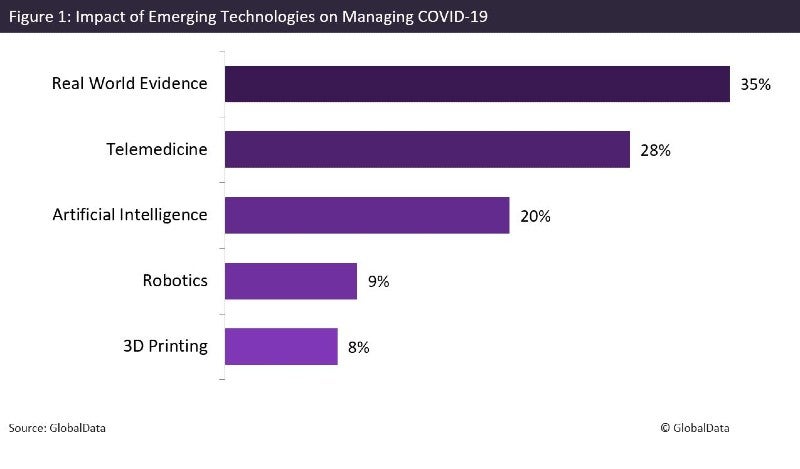With many healthcare systems stretching their available resources to the breaking point in an attempt to deal with the Covid-19 pandemic, and trends shifting towards digitalisation and patient-centred virtual care, there is increasing pressure on the healthcare sector to innovate in order to offer faster, more effective, cost-saving treatment approaches. Despite being one of the slowest sectors to innovate, the healthcare services hit by the Covid-19 outbreak are ready to embrace digitalisation and to move toward proactive rather than reactive and treatment-focused models. While technology is constantly evolving, finding new applications and use cases in healthcare, the healthcare sector is still a long way from being able to realise its full potential.
As the Covid-19 outbreak continues to take its toll on global markets, real-world evidence (RWE) is set to become the most influential emerging technology to help in the fight against the Covid-19 outbreak, according to the latest poll on GlobalData’s Pharmaceutical Technology website. In this poll, which was completed by 935 of its readers during 6-20 April, more than one-third of the respondents indicated that real-world evidence will have the greatest impact in the management of Covid-19. A smaller percentage of the readers identified telemedicine (28%) and artificial intelligence (AI) (20%) as the most important emerging trends. Even though emerging technologies such as telemedicine have existed for decades, most of the healthcare system relies heavily on in-person interactions between patients and clinicians. Nevertheless, the current requirement for social distancing measures is swiftly pushing the primary care provision toward remote care. Telemedicine and virtual care may also prompt a greater uptake of technologies such as wearables and digital therapeutics, thus accelerating digitalisation in the healthcare space and boosting the importance of RWE and AI.
Figure 1 presents the percentage of respondents who rated each technology as the most impactful in managing Covid-19 outbreak.
RWE can provide valuable insights to better understand, monitor, and prepare for the challenges caused by outbreaks such as the Covid-19 pandemic. The utilisation of RWE in infectious disease control is not a new concept. During the Ebola outbreak in 2014, forecasters successfully used Global Epidemic and Mobility (GLEaM) simulations that combined real-world data on populations and their mobility with rigorous stochastic models of disease transmission to predict the global spread of the disease. By understanding where and how quickly the outbreak is likely to spread, the same tracking models could be adapted to fight any upcoming Covid-19 outbreaks. Even though most countries have announced decreasing death rates from Covid-19, a vaccine against Covid-19 is expected to take more than one year to reach the market, and scientists predict that there will be more than one wave of the outbreak. As such, real-world evidence may become an essential tool in trying to suppress Covid-19.
Technological advancement has made it possible to aggregate the data from more traditional reporting tools and technology networks such as mobile apps. Mobile contact-tracing apps have played an important role in easing the spread of Covid-19 in China. Government-backed apps analysed personal data to group individuals into color-coded categories corresponding to their health status and level of risk to contract Covid-19. Following success in China, an increasing number of countries have started to look for ways to implement similar measures nation-wide. In countries with strict data privacy laws, the implications of contract-tracing apps on individual privacy are considered a major associated concern. While cryptographers are currently working on improving tracing apps to address the issue, tracking apps can only be effective when they are used by a significant proportion of the population. Therefore, it is critical that the functionality and safety of these applications are considered acceptable by the majority of the population. By the end of April, Singapore’s new Covid-19 contact-tracing app, TraceTogether, had been downloaded by only one-fifth of the population since its launch in March. University of Oxford researchers suggested that the epidemic can be suppressed with at least 56% of the population using the app.
Through the analysis of the data generated from these various networks, healthcare organisations can benefit from sensible information, resulting in real-time disease monitoring and control. However, as the use of technology as a means to produce more and more data to drive insights and foresight increases, the ability to automate and analyse that data becomes a necessity. Accelerated digitalisation in the healthcare space has revealed gaps in infrastructure, workforce, and digital education that ultimately need to be bridged. Without intelligent analytics, RWE alone will not be able to produce meaningful and actionable results.

US Tariffs are shifting - will you react or anticipate?
Don’t let policy changes catch you off guard. Stay proactive with real-time data and expert analysis.
By GlobalData




